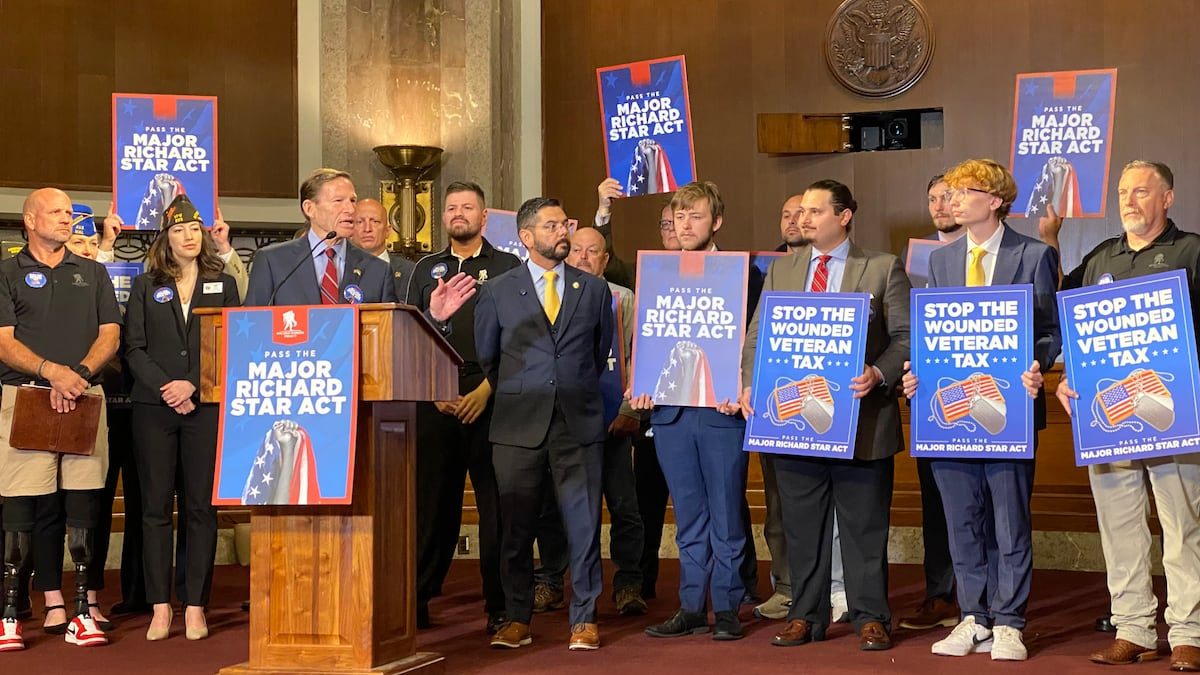After years of hearing cost complaints from lawmakers, advocates believe they have finally reached a funding solution for their major disability reform plan, providing thousands of dollars a year to 54,000-plus wounded veterans nationwide.
“In March, Veterans Affairs leaders announced contract terminations that could save almost $1 billion,” said Patrick Murray, a disabled veteran and former Veterans of Foreign Wars senior leader during a Capitol Hill press conference on Wednesday. “In April, the Defense Department announced they eliminated nearly $6 billion in wasteful spending for their budget.
“So it looks like our money has been found. [Defense Secretary] Pete Hegseth and [VA Secretary] Doug Collins have both expressed the importance of focusing on what the warfighter and veteran have earned, and this bill is a perfect example of where those dollars should go.”
Murray’s comments came during a rally urging passage of the Major Richard Star Act, legislation that has been a key priority of numerous national veterans advocacy groups for the last several years.
RELATED
The bill boasts more than 70 supporters in the Senate and more than 200 in the House, but funding issues have derailed legislative momentum in recent years. Wednesday’s event was a mix of optimism and frustration from participants, who said they hope to end the annual rally this congressional session.
“We’re going to get this done,” said Sen. Richard Blumenthal, D-Conn., ranking member of the Senate Veterans’ Affairs Committee. “I’m going to offer it as an amendment to the National Defense Authorization Act next month. If we don’t get that, we can make it a stand-alone bill. One way or another, we have to do this.”
Named for an Army veteran who died from cancer complications in 2021, the Major Richard Star Act deals with how veterans’ disability benefits are classified under federal statute.
Since 2004, veterans who collect both military retirement after 20 years of service and veterans disability benefits receive both stipends in full if they have a disability rating of at least 50%. The combined total of the two benefits can amount to several thousand dollars each month.
But under federal rules, veterans forced to retire early from the service because of military injuries are subject to dollar-for-dollar offsets in their military disability and VA disability benefits. That means that officials subtract several hundred or several thousand dollars each month from what individuals could potentially receive, leaving a gap in their income.
For some veterans who spoke at Wednesday’s rally, the years of lost income total hundreds of thousands of dollars.
“This is a wounded veteran tax, and we have to fix this policy that unfairly penalizes veterans forced to retire as a result of their injuries,” said Jose Ramos, vice president of government and community relations at the Wounded Warrior Project.
“There is no good reason why veterans from across the country are here again to ask for this.”
The legislation is estimated to cost up to $9 billion over the next decade, a number which advocates have disputed as too high. But they also argued that recent work to find federal contract and program savings more than covers that anticipated expense, arguing that redirecting those funds to the benefits checks would ensure the money is put to good use.
That’s unlikely, given that defense and VA leaders have said they plan to use those savings for existing department priorities.
The contract cuts themselves have been controversial, with lawmakers like Blumenthal lamenting a lack of transparency in what services have been cancelled and whether the long-term promises of savings are realistic.
Congressional appropriators are expected to spend the next few months debating the scope of the savings and their future use as part of the fiscal 2026 budget process.
But advocates hope that highlighting the bureaucratic efficiency work will help spur movement on the Star Act, showing that a solution to the remaining legislative barriers isn’t far away.
“Every year, it feels like we get close, but then the football gets pulled away at the last moment,” said Jack Du Teil, president of The Military Coalition. “We need to dig deeper and fix this.”
Leo covers Congress, Veterans Affairs and the White House for Military Times. He has covered Washington, D.C. since 2004, focusing on military personnel and veterans policies. His work has earned numerous honors, including a 2009 Polk award, a 2010 National Headliner Award, the IAVA Leadership in Journalism award and the VFW News Media award.
Read the full article here


